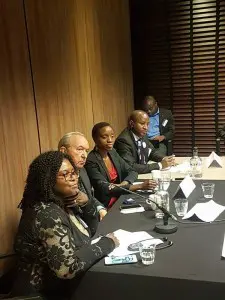
Internationally, human rights are interpreted as being indivisible, interrelated and applicable to everyone. Unfortunately, this fundamental principle is sometimes forgotten during constitution-making processes, as in the case of rights for LGBTI persons in Zambia.
In April 2012, Zambia published a draft Constitution after a protracted constitution-making process dating as far back as 1972. The last attempt at Constitution-making, produced by the now infamous National Constitutional Conference, failed to get a required two-thirds majority in parliament in 2010. In December 2011, the President Mr Michael Chilufya Sata, appointed a Technical Committee to draft a new Zambian Constitution thereby fulfilling campaign promises of the new Government. The Technical Committee on Drafting the Constitution’s work culminated in the launch of the April draft document. Since then, the draft Constitution has been the subject of further consultations, with the expectation of the release of a final draft Constitution and a Referendum before the end of the year. This process has not been without hiccups, for example, on 20 August 2012, a group of civil society organisations, the Oasis Forum (comprising the Council of Churches, Law Association, NGO Coordinating Council and Episcopal Conference), released a statement highlighting concerns regarding the transparency of the process.
The 1991 Constitution’s Bill of Rights, which is currently in force in the country, enshrined various rights including the right to equality, privacy, expression and association and freedom from cruel, inhuman and degrading treatment. The April 2012 draft Constitution is much broader and adds, for example, the right to dignity, fair labour practices, health, disability and family life.
The prohibition of discrimination in Zambia’s draft Constitution is open-ended – stating
“A person has the right not to be discriminated against, directly or indirectly, on any grounds includingbirth, race, sex, origin, colour, age, disability, religion, conscience, belief, culture, language, pregnancy, health, marital, ethnic, tribal, social or economic status.”
Such lists of prohibited grounds have been interpreted liberally by courts in South Africa, Botswana, Namibia, Swaziland and Malawi, and we have seen an easy acceptance by courts that such grounds include analogous grounds such as HIV status, even though it is not specifically articulated in the Constitution.
Given the prominence that human rights jurisprudence attaches to the right to equality, freedom from discrimination and dignity, it comes as quite a surprise that the Zambian Human Rights Commission (ZHRC), has argued against the universal application of some rights in its response to the draft Constitution. In its submission released in July 2012, the ZHRC notes that the clause is “very open ended and may lead to the handing of certain rights to or inclusion of certain groups that the people of Zambia may not be ready or willing to accept. In particular this concern is directed at members of the LGBTI community.”
For a body tasked with protecting human rights, the Commission takes a startling position – “human rights are universal but their enjoyment is not absolute. It is subject to the cultural, moral, religious, legal, economic and social context of the community/country in which they apply.” The Commission further recommends that the list of prohibited grounds should be exhaustive and “terms such as ‘conscious’ and ‘belief’ should be removed as there is a danger that such groups could have these rights recognised on these bases.”
The Commission’s submission further takes the position that the right to human dignity is not enforceable by courts or worth including as a substantive right in the Bill of Rights. The ZHRC also suggests the removal of the clause advocating for programmes which would advance the inclusion of minority and marginalised groups in all spheres of life, arguing that minority and disadvantaged groups do not really exist and are already catered for. This type of argument shows an unfortunate short-sightedness which places at risk the ability of minority groups to assert their rights in future. The Constitution Consultative Process Guidelines issued by the Technical Committee in 2012, specifically state that the principles which will govern validation of the Constitution, include that it provides for extensive rights and freedoms, and stands the test of time by ensuring its provisions are flexible and inclusive.
As the Constitution-making process enters its next phase in Zambia, it is important to ensure that the provisions in the final document reflect flexibility, inclusivity and tolerance. Living in Southern Africa, our personal views and laws have been influenced by the colonial period, which encouraged intolerance, emphasised difference, and justified violence and exclusion. To break from this line of thinking, we need to foster a culture at all levels of society which embraces difference and respects the rights of all – regardless of whether we agree with them or not. In many communities there has, for centuries, existed an acceptance of diversity and tolerance of difference and minority groups, including for LGBTI persons. People are not individuals, they are part of families, and the need to maintain relations between people has been seen to be stronger than any benefit of destroying relations. Working together towards a society which values diversity and accepts the universality of rights, will lead to a healthier society for everyone.



